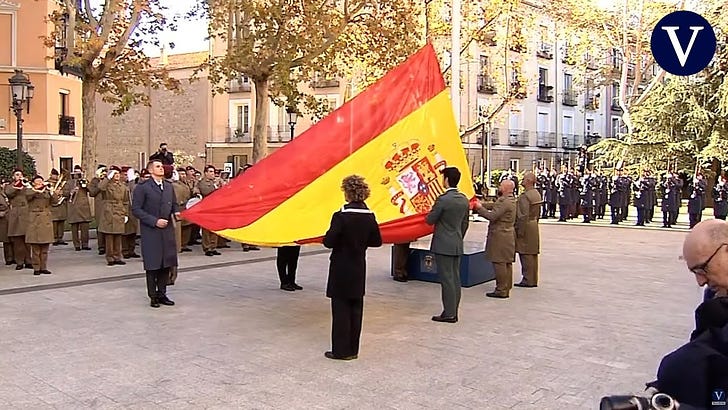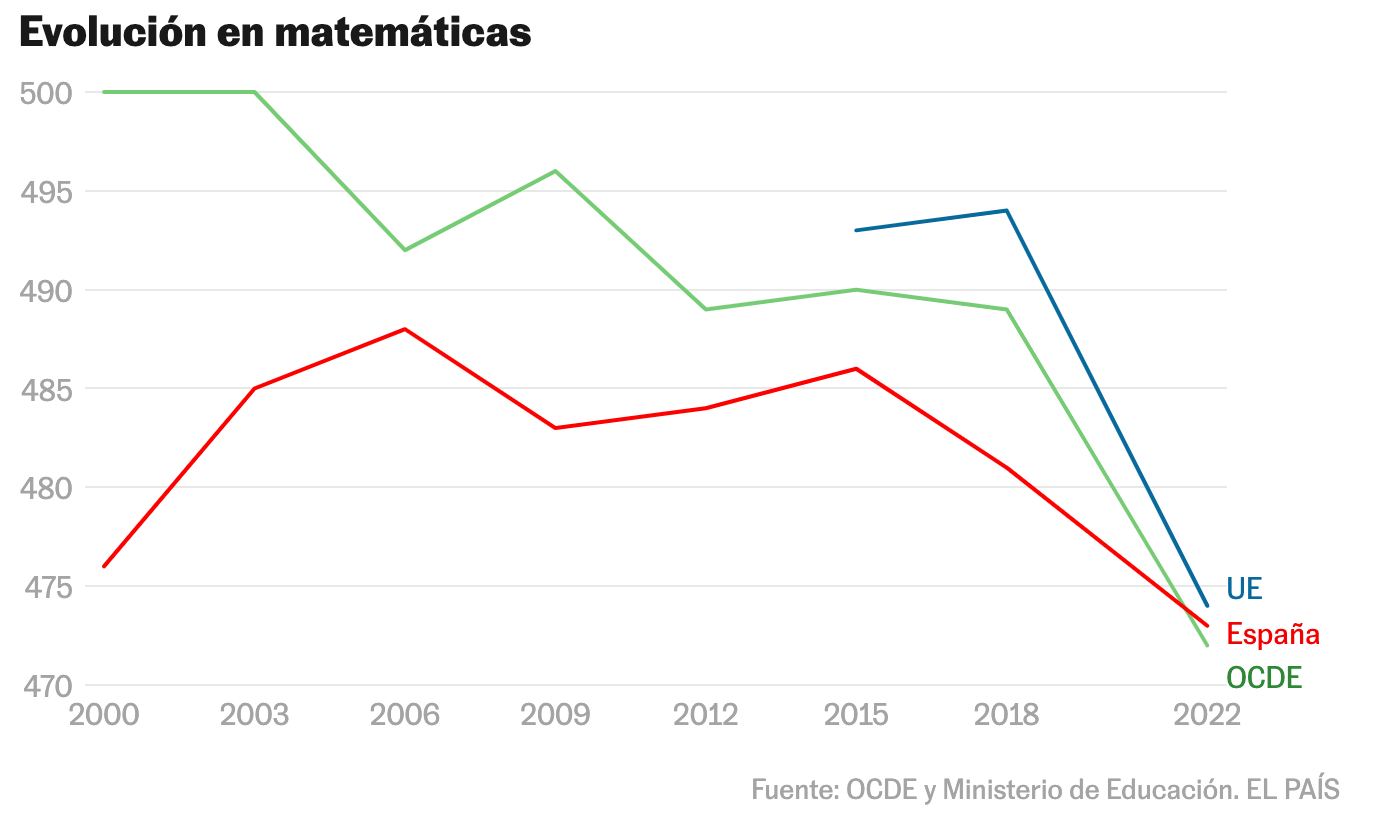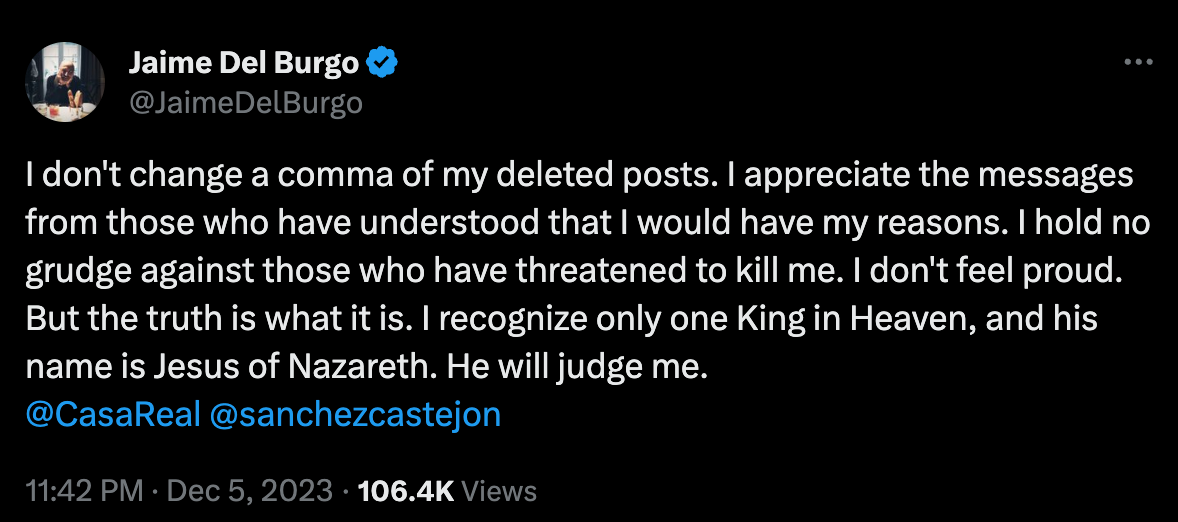💔 This Week in Spain: Breaking Up Is Hard to Do
Also: Enrique Iglesias sells himself and yet another spy scandal.
By @IanMount and @AdrianBono | December 7, 2023 | Madrid | Issue #36
🎉 Welcome to The Tapa, an English-language, weekly newsletter about all things Spain!
🥜 This Week in a Nutshell: Happy macropuente, everyone! Chances are you will not read this today as many of you are enjoying a much-deserved, pre-holidays, super-long weekend that started yesterday. We thought not much would happen this short week, but we were wrong. Vox and Podemos have decided to break up with their political partners, and we tell you all about it here.
🙏 Remember that if this email gets truncated at the bottom because it’s too long, just click here to read the rest on Substack.
🙌 But wait, there’s more! The Tapa has its very own LinkedIn page to grow a new community. Please check it out and, if you’re so inclined, follow us here.
🕺If you haven’t subscribed yet, please do so by clicking on the button below.
🫶 And if you already have, please send this newsletter around to your friends and family and help us keep growing.
Going it alone
Vox and Podemos Break Up With the PP and Sumar
Everybody got divorced this week (politically)! 😱
But first things first: it was Constitution Day yesterday (hence the holiday 🎉) and there was a big ceremony in the Senate and in Parliament celebrating the 45th anniversary of Spain’s magna carta. Most major political parties were present (except, well, Vox and nationalist/separatist blocs Junts, ERC, EH Bildu, PNV and BNG) and of course there was drama.
Remember, there is always drama.
The Constitution was not feeling super celebratory 😢, as both PP and PSOE are accusing each other or not respecting it. PP leader Alberto Núñez Feijóo said before entering the ceremony that the amnesty talks have taken us to a “constitutional crisis”.
Sánchez responded that Feijóo should stop “beating his chest”—and more importantly stop blocking the constitutionally mandated renewal of the General Council of the Judiciary (which runs the politicized court system that we covered before). “No more excuses,” he said.
The ceremony concluded with Parliament speaker Francina Armengol (PSOE) calling for a return to dialogue without confrontation. Which would carry more weight if she didn’t seem to be sorta pro-confrontation.
OK, now let’s move on to the story of the week.
No longer besties. Far-right party Vox announced on Monday that it was breaking relations with center-right party PP, led by Núñez Feijóo.
Vox Secretary General Ignacio Garriga said at a press conference from the party HQ that it was no longer possible to keep a “coordinated action” to “stop the coup” led by Prime Minister Pedro Sánchez (“the coup” being, you know, the whole amnesty thing).
Garriga criticized the PP for their recent agreement with the PSOE-Sumar coalition government over the distribution of leadership of the parliamentary committees (PSOE will lead 15, PP will lead 12 while Sumar will lead 6).
This procedure is customary and necessary in order for Parliament to begin operating. However, Vox decided not to participate in it as it required negotiating with the Sánchez-led government (so now they aren’t leading any committee 😢).
Garriga said the fact that the PP had engaged in negotiations with MPs across the aisle showed that the center-right “does not want to work hand in hand with Vox to stop the coup” and that Spanish people “do not understand why the PP is more obsessed with distancing itself from Vox than from the PSOE”.
But wait! What about the five regional governments in which the PP has formed a coalition to rule with Vox? Glad you asked.
Garriga was very clear that they were breaking up with the PP on a national level and that this decision will not affect how they operate in Valencia, Extremadura, Aragón, Castilla y León and Murcia.
“We will work from the autonomous governments and with those regional leaders to stop the coup,” he said.
This breakup announcement seems to be the fruit of weeks of frustration by the Abascal-led party, which has amped up its rhetoric against the Sánchez administration, saying it’s gone from being an “illegitimate” government to an “illegal” one.
Garriga also complained that “Vox has supported Feijóo's investiture (as prime minister), has offered all sorts of coordinated action … and the result has been attacks, disdain, and agreements with Sánchez and Sumar."
Vox is so mad that they decided to skip the official celebration on Constitution Day (Zoinks!! Like, aren’t these guys are Constitution super-fans?) and instead gathered yesterday outside the PSOE headquarters, where Abascal once again attacked the PP.
The far-right leader said his party wouldn’t be “an accomplice by action or omission to Feijóo’s lie” and accused the PP leader of “mobilizing the Spanish people one day” (in reference to last Sunday’s PP-led, anti-amnesty demonstration in Madrid) and “making deals with the coup-mongers in Parliament another”.
This could actually help Feijóo and the center-right PP. It’s no secret that for a while they have been trying to woo those voters disillusioned with Vox, and this could be the perfect opportunity to welcome them back to the party they left over the past decade.
But this wasn’t the only political drama this week!
On the other side of the aisle, the relationship between leftist coalition Sumar, led by Yolanda Díaz, and far-left Podemos also came to a bitter end on Tuesday (and again, we all saw it coming because they’ve been hating on each other for months).
The far-left Podemos, which took a beating in this year’s regional and national elections, slid into quasi-irrelevance and had no choice but to begrudgingly become a
partprop of Sumar in order to form a progressive front.The tension between Podemos and Sumar over the last few months was palpable. Former Deputy Prime Minister Pablo Iglesias (who remains Podemos’s “spiritual” leader) detests Yolanda Díaz and regularly says that he regrets providing her with a platform that raised her profile.
Díaz, who knew both Iglesias and his party were seen as toxic by much of the Spanish electorate, decided to rebrand the progressive movement by creating a new umbrella coalition (Sumar) earlier this year and giving Podemos the option to join—but on her terms.
Podemos MP and spokesperson Javier Sánchez Serna said on Tuesday that despite efforts to the contrary, they found it “impossible” to continue being a part of the Sumar bloc and that they were moving to the Grupo Mixto (mixed group) bloc in Parliament.
So what is the Grupo Mixto?
Basically, the kids with no friends. The Mixed Group is a parliamentary bloc that includes all parties that don’t have enough seats to create a bloc of their own (you need at least 15 seats to form a bloc). It currently includes three MPs: Alberto Catalán Higueras (UPN), Néstor Rego Candamil (BNG), and Cristina Válido García (Coalición Canaria).
Welcome to the uncool. As there are only five Podemos MPs (Ione Belarra, Javier Sánchez Serna, Martina Velarde, Noemí Santana, and Lilith Verstrynge), breaking away from Sumar means they have no choice but to be a part of the Grupo Mixto.
So, what drove Podemos to break away from Sumar?
Muzzled: Sánchez Serna said the decision was motivated by the inability to “do politics”. Basically, Podemos has not been allowed to speak during plenary sessions since the new Parliament was formed in August, nor been able to introduce bills or motions, which they can’t file without the approval of an authorized MP.
No power: Apparently Pedro Sánchez’s PSOE was open to having Podemos’s Ione Belarra as a minister in the gov, but Sumar boss Yolanda Díaz nixed the idea. That’s cold!
Then an unhappy surprise: It seems that both Díaz and Sánchez found out about Podemos’ decision through the media.
Podemos boss Ione Belarra spoke to reporters on Wednesday (Constitution Day) before entering the ceremony in Parliament and explained her party’s decision.
The far-left leader said it was “a difficult but necessary decision in order to fulfill the mandate of the people who believe in Podemos,” which, she explains, “must continue to be a useful tool to continue transforming" Spain.
Describing her differences with Sumar regarding the conflict in the Gaza Strip, she said “it is very evident that we need a voice that speaks clearly, loudly, and unequivocally". (Belarra has been very vocal about what she says is a “genocide” against the Palestinian people and the “need to stop Netanyahu”).
Yolanda Díaz (of course) was asked about Podemos’ at Wednesday’s Constitution festivities, to which she responded that the far-left party’s decision “contributes to the citizens' disillusionment” and warned that "progressive individuals in Spain wouldn't understand jeopardizing good public policies for the sake of their own interest”.
So… what happens now?
Some believe Podemos could become a headache for the coalition government led by Sánchez—on top of having to negotiate every bill with the separatists and nationalists, they will now have to add the far-left party to that list.
Belarra said that she had already contacted Justice Minister Félix Bolaños to tell him that Podemos would not jeopardize the government’s stability but warned him that they intend to negotiate bill by bill to achieve greater social advances and the expansion of rights.
Sánchez has his work cut out for him.
🔔 A Message From Our Sponsor
Bucólico Café is a project of connection that was born as a specialty coffee shop.
We value time and understand that it represents both a cycle and an instant—chronology and nostalgia. Bucólico is a space that connects one’s soul with the purity, lightness and beauty of the countryside—while being in the city. Via a cup of coffee, a piece of cake or a song…
Located on Calle de Barbieri 4 — a few blocks from Plaza Chueca — Bucólico reassures the soul with a feeling of home.
Follow Bucólico Café on Instagram.
💬 Five things to discuss at dinner parties this week
1. 🥸 Spies like US…
Two spies with Spain’s CNI (the local CIA or MI6) were busted for passing secrets to another country’s intelligence service. For being double agents, that is. Which is not what you want out of your agents. Because being a double agent doesn’t make you 2x as good, right?
With friends like these… If you want to talk about double-crossing, they were busted not for passing secrets to an enemy, but to a friend—America’s CIA.
Nabbed in September. According to El Confidencial, which broke the story, the two were caught in September for passing on “maximum secrets” after the secret services caught them viewing information they weren’t authorized to access.
But what did they steal? Well, the thing about secrets is, you’re not supposed to reveal them. So Spain has been mum about the specifics. ABC suggested that the U.S. was interested in intelligence about Latin America. The most that El Confidencial was able to get out of Defense Minister Margarita Robles during a visit to Lithuania was that, yes, there was an investigation and two had been arrested. One remains in jail while the other is out on bail.
These are not the droids 🤖 spies you’re looking for. The government of Spain’s PSOE PM Pedro Sánchez would like nothing better than for this whole incident to just…go away.
It’s big-time awkward. Spain and the U.S. are, you know, allies, and it’s not exactly a symmetrical friendship power-wise. Plus, Spain’s a bit in the U.S. doghouse over its criticism of Israel. So criticizing the Biden administration is not a palatable option.
Spanish gov spokeswoman (and Minister of Education and Science) Pilar Alegría limited her comments to calling the situation “confidencial” and saying there was “maximum cooperation” between the countries. This morning, we learned that two American spies were discreetly expelled from Spain and that Defense Minister Margarita Robles called for a meeting with U.S. ambassador Julissa Reynoso after the summer to discuss the issue.
Not that everyone is being so discrete, because…politics. Other parties are marking their territory—and how.
PSOE’s coalition partner Sumar blamed the U.S., via its rep Marta Lois: "It is always serious when an ally spies on you, but if possible it is even more serious if they buy security agents from your country so that they can pass information to them."
The opposition PP demanded that the PSOE “offer explanations” for the breach and accused it of “compromising our country’s security,” in the words of PP spokesman Miguel Tellado. "We have the feeling that there is no one at the helm,” he said. “The Government is more focused on its own political survival than on addressing the problems of our country."
Not the first time. Spain has suffered other spy-related underhandedness in the past.
The CNI accused former spy Roberto Flórez of giving info to the Russians in the early 2000s, and he was sentenced to 12 years in prison in 2010.
Juan Alberto Perote was sentenced to seven years in prison in 1997 for stealing secret microfiches holding classified information about the dirty war against ETA—that ended up in the possession of über-banker Mario Conde.
2. ❌ Worst result ever!
The OECD’s PISA tri-annual worldwide education assessment was not kind to Spain when it was released this week. Iberia’s bigger brother got its absolute worst note since the ranking was launched in the year 2000. Which is bad, right?
Seriously, the worst. Spain’s 4th year ESO students (10th graders, for the Americans reading) saw their mathematics scores drop eight points, to 473, their reading comprehension scores drop three points, to 474, and their science scores rise (phew!) two points to 485.
But really, maybe not so bad. The results were not positive, clearly. But look at it this way: the average OECD country saw drops of 17, 11 and 4 in mathematics, reading and science, and EU countries fell even more, with drops of 20, 14 and 6, respectively.
So Spain is closer than ever to the average for OECD and EU countries. Which means it was kind of a banner year, because by doing less bad, Spain sorta caught up. Which is a sad way of winning, but a win’s a win, right? Look at this graph…
What’s really going on here? Can you say COVID-19 pandemic…
Basically, kids’ learning the world over got screwed by lockdowns and school closings during the pandemic. The difference is that Spain re-opened schools earlier than many other countries, under the (correct in retrospect) theory that kids weren’t in danger and were better served by school. So while Spain’s students were hurt, they were hurt…less.
You want proof the pandemic had an effect? This PISA was meant to take place in 2021 (the last one was 2018) but was postponed to 2022 because of a certain virus thing.
But…politics! Spain’s results were broken out by region (like in every country) and as you can imagine in a “pluri-national” country with a variety of language, political gain was to be had.
Catalonia had an especially bad note in reading comprehension, which dropped 22 points from basically the top to the bottom of Spain’s regions.
This is rather embarrassing for a government run by nationalist/separatists who push the idea that having kids study almost all of their subjects in Catalan (as opposed to Castilian Spanish, the native language of many) encourages societal cohesion and is good for education.
The autonomous region’s education ministry attributed the bad results to a high number of immigrant students being included in the sample. Which seems sorta unkind and a little dirty, no? The Catalan authorities apparently realized this, and climbed down less than a day later.
Cheap shots from the right. Of course, it’s far too facile to blame the bad results in Catalonia (and Basque Country, another nationalist-heavy community) on their focus on area languages. But that didn’t stop Spain’s right-wing press from jumping to conclusions. Cue ABC, which headlined its article, “Linguistic immersion takes its toll on students from Catalonia and the Basque Country in the PISA report.”
In the infamous words of George W. Bush, “is our children learning”? It depends on who you ask.
3.👸🏻 And Yet Another Royal-Adjacent Scandal
This is a weird one but it was trending on Twitter for a few days and lots of people were talking about it, so we pretty much had no choice.
An X (formerly Twitter) account supposedly belonging to a man named Jaime del Burgo on Sunday tweeted the selfie of Queen Letizia seen above along with a message that caused quite a stir.
Del Burgo is, according to local publications, the Queen’s former brother-in-law and childhood friend, and in these posts he was apparently saying that he and Letizia had had an affair before and during her marriage to King Felipe VI.
“My love, I’m wearing your pashmina. It’s like feeling you by my side. It takes care of me, protects me. I count the hours until we can meet again”. The posts were later deleted, but the damage had been done. They’d already gone viral.
Del Burgo, an entrepreneur, was married to the Queen’s sister Telma Ortiz from 2012 to 2014. In fact, according to El País, it was Queen Letizia who introduced him to her sister (apparently he was also present at the royal wedding).
The X account started posting content about Letizia in late November, with Del Burgo assuring that he had a torrid affair with the Queen that lasted years and that started even before she married King Felipe in 2004.
So, what the hell is going on? Yes, this is all very confusing. And if you expect us to provide you with answers, we won’t, because we don’t have them. But at least we can provide you with context.
These revelations come shortly after the publication of the book Letizia and I by journalist Jaime Peñafiel last month. Peñafiel is not a huge fan of the Queen, and has maintained that “she wasn’t fit to be queen” and that “had they done a bit of research there would have never been a wedding”.
This new book includes quotes from Del Burgo, in which he says that he “almost proposed” to her. On Twitter, he also commented (and then deleted) that back in 2010 he stayed at the Zarzuela Palace with Letizia, where they allegedly said “I love you” to each other. Palace intrigue indeed!
The Royal Family has not made any statements so far about Del Burgo’s posts (or the book). But his statements have launched all sorts of conspiracy theories.
Some say that this is all orchestrated by Prime Minister Pedro Sánchez in an attempt to move attention away from the amnesty deal. But this theory might not work, as Del Burgo’s account has retweeted someone defending his statements and explaining he was just acting to “avoid the tragedy” designed by “Sánchez, ETA (??), the coup-mongers and Letizia … responsible for the King Emeritus’ exile”.
Most of the controversial tweets have been deleted. Is it his account? We don’t know, but it looks like it is? (Anyone can have a verified profile these days if you pay Elon Musk his $8, so your guess is as good as ours). But recently he has tweeted both in Spanish and English, saying this.
You be the judge (not Jesus).
4. 🏍️ Now, about those, um, “antique” sports metaphors…
MotoGP motorcycle racer Jorge Martín (aka the “Martinator”) came in second in this year’s championship, and his appearance on El Hormiguero this week was meant (we assume) to be celebratory.
And it was, to a point. Martín was fairly revelatory and self-aware, telling El Hormiguero host Pablo Motos that he reacted poorly to the pressure of being in contention for the championship in 2023, only his third season at the top MotoGP level.
“In the last few races the pressure was through the roof and whatever went wrong, I was on [the team],” he said, Crash reports. “It wasn’t a happy period and my nervousness was reflected on the team.”
Martín crashed into fellow Spaniard Marc Marquez in the Valencia race, forcing him out of the race and ending his pursuit of the championship. “Either I fell or I won,” he said of his risky mentality. “It was all or nothing.” After he dropped out of the race, he broke down in tears.
“Feeling so superior at that moment and wanting to humiliate my opponents so to speak, made me fail,” he said of his failure to win the championship. “I learned that you can win a race by a second or two tenths, the points remain the same.”
So far, so good. But then Martín tried to explain why he was friends with only one other driver, Aleix Espargaró, and how he competed all out with the rest.
Martín said, starting seriously, “We have a lot of respect for each other, we’re risking out lives and it can be very dangerous.” Martín then adds, apparently meant as a joke, “But here, he who finishes last is a fag.”
In Spanish: “Tenemos mucho respeto, nos estamos jugando la vida y puede ser muy peligroso… pero aquí, aquí marica el último.”
Some in the crowd laughed, but host Pablo Motos briefly froze, paralyzed, as if he was hoping to disappear. It’s been a tough stretch for Motos, in terms of dealing with guests emitting homophobic slurs and other facepalms.
Alfonso Guerra, a old-time PSOE socialist party bigwig, appeared on the show several weeks ago, and complained that you couldn’t make fun of people like in the past.
“I feel very sorry for comedians,” Guerra started. “They can't talk about anything anymore. Before there were jokes about homosexuals, about dwarfs, about everything... and now there aren't. That is limited freedom of expression—that is, censorship.”
Past, meet present. Well, at least we’re having the conversation out in the open.
5. 🎙️ I’ll trade you my Bruce Springsteen for 5 Enrique Iglesiases
Spanish star singer-songwriter Enrique Iglesias is really getting out of the music game. After announcing in late November that his upcoming studio album will be his last one, he’s now sold his entire musical catalog, along with rights to his name, image, and likeness—basically his work, fame, and career—to New York-based Influence Media, a Warner Music and Blackrock-backed fund that, well, buys musicians.
$100 million. Iglesias’s “people” didn’t reveal the exact price but let out that it was in the “nine figures”, so let’s peg it at $100m, because if it had been more they probably would have said so.
Dylan, Sting and Springsteen. That’s ⅕ of the $500m Bruce Springsteen got for his catalog and ⅓ of the $300m Bob Dylan raised, though a bit closer to Sting’s $250m. Still, we’re never thought he quite achieved the same fame as those three (nor does he have Dylan oddly awarded Nobel Prize, but that’s for another day).
“Lylette got a bargain,” Iglesias’ longtime manager Fernando Giaccardi told Bloomberg, referring to Influence Media founder Lylette Pizarro. “We could’ve gotten more money if we went to more places but we didn’t because it wasn’t about that. It was about the relationship, how can we help each other and brand the music.”
We still think it was at least a little about the money. But maybe we’re shallow..
Next steps. Now the 48-year-old son of always-in-the-news Isabel Preysler and the world’s smoothest dude and 49th richest Spaniard (aka Julio Iglesias) can now focus on his long relationship with tennis celebrity Anna Kournikova and their three kids.
Iglesias is currently on the “Trilogy Tour” with Ricky Martin and Pit Bull so he’s not, like, totally retired.
We’re totally sure that the $100m+ of the catalog deal will ease any pain Enrique might feel from insults from people like Perez Hilton who say he cannot sing and never really could or from a viral video from a fan showing his autotune failing in a show, leaving Enrique sounding like Kermit the Frog. Not that we like to poke fun or anything.
🙏 Before you go, please remember to share this newsletter with your friends on social media. The more we grow, the more information we’ll be able to offer each week.
We’ll be back next week with more.









